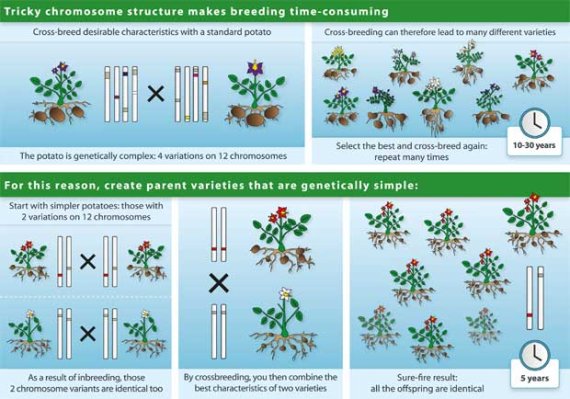Lindhout thinks that with the aid of a new breeding method it will soon take just five years to develop a new species. The key to his approach is that he dramatically reduces the genetic variation. First, he takes potatoes from the breeding programme run by Ronald Hutten, a Wageningen researcher. These have not four but two versions of each chromosome. Next, he seeks a way to make these two versions identical. Self-pollination is one means; if the plant self-pollinates exact copies of the chromosomes emerge after a couple of generations. To do this, he needs a special gene (Sli) from a related wild species.
Rat droppings
The potato breeder usually pays a high price for inbreeding. Many breeders believe it delivers offspring that are not viable or produce tubers the size of rat droppings. But Lindhout started to think exactly the opposite. ‘More inbreeding is just what is needed. The potato contains many genes that cause defects. I want to lose those genes.’ In his potatoes these genes would cause a high level of mortality, but statistically they should also produce some good plants. And with those, he would be able to continue the breeding process. Using a field trial, he tested this hypothesis. He planted 10,000 seedlings in trial plots and harvested 50 plants with good-sized potatoes. In December he and the Laboratory of Plant Breeding reported this result in the scientific journal Potato Research. With those 50 plants he is continuing his work. ‘The research is progressing faster than expected, but there’s still a risk of failure.’ He foresees challenging possibilities. ‘If the subsequent development succeeds, in five years’ time we’ll be able to produce a potato species with resistance to Phytophthora.’
Scientific entrepreneur
Pim Lindhout spent years working as a researcher in Wageningen before he joined the breeding company De Ruiter Seeds. There, as R&D director, he worked on tomato breeding. He left this company after it was acquired by Monsanto in 2008, and with three colleagues he set up Solynta in Wageningen. This small company focuses solely on potato breeding methods. If Lindhout succeeds, his work will revolutionize potato breeding. Today, potato species with good characteristics are reproduced to create seed potatoes by means of vegetative propagation. This product is then shipped to buyers. Using Lindhout’s new method, buyers would need to purchase only bags of potato seeds.

